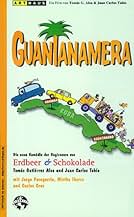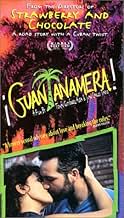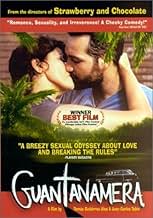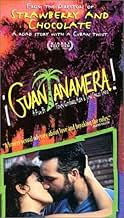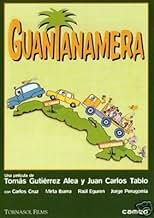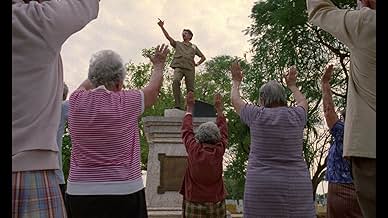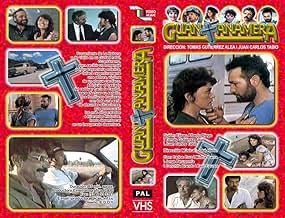AVALIAÇÃO DA IMDb
6,9/10
1,6 mil
SUA AVALIAÇÃO
Durante um cortejo fúnebre em Cuba, motoristas de caminhão e pessoas do funeral se envolvem em conversas profundas sobre a vida, revelando diferenças e semelhanças entre suas experiências.Durante um cortejo fúnebre em Cuba, motoristas de caminhão e pessoas do funeral se envolvem em conversas profundas sobre a vida, revelando diferenças e semelhanças entre suas experiências.Durante um cortejo fúnebre em Cuba, motoristas de caminhão e pessoas do funeral se envolvem em conversas profundas sobre a vida, revelando diferenças e semelhanças entre suas experiências.
- Direção
- Roteiristas
- Estrelas
- Prêmios
- 7 vitórias e 1 indicação no total
Mirtha Ibarra
- Georgina
- (as Mirta Ibarra)
Luisa Pérez-Nieto
- Marilis
- (as Louisa Pérez Nieto)
José Ángel Espinosa 'Ferrusquilla'
- Justo
- (as Jose Antonio Espinosa)
Rubén Breña
- Rivero
- (as Rubén Breñas)
- Direção
- Roteiristas
- Elenco e equipe completos
- Produção, bilheteria e muito mais no IMDbPro
6,91.6K
1
2
3
4
5
6
7
8
9
10
Avaliações em destaque
An Attitude
Guantanamera is a very laughable movie.The events sometimes seem absurd, however they are real.Guantanamera portrays situations that are common in daily Cuban life.The Director went beyond official parameters and adopted a critical attitude before the difficulties faced by people in actual Cuba.It is like Gutierrez Alea tells us: "let's laugh of our disgrace." Gutierrez Alea earned two things with this movie: the laugh of the audience, and the ire the President of his country in one of his speeches
Nice comedy about Cuban bureaucracy
Interesting satire on the Cuban bureaucracy. During the special period. Undresses the weakness of communist systems and their inability to provide logical answers within their rigid structure.
It is one of Titon's last works. But you can see the hand of the best Cuban film director. An excellent acting collective bringing together many of the best actors available at that time on the island. It is not the best film of its director but it makes it a adjustable time. The skinny part is that its problems are very local, which means that it is not received abroad as a strawberry and chocola by example. Also that limitation in time and space means that over the years I go losing the luide and the sympathy of its extreno.
It is one of Titon's last works. But you can see the hand of the best Cuban film director. An excellent acting collective bringing together many of the best actors available at that time on the island. It is not the best film of its director but it makes it a adjustable time. The skinny part is that its problems are very local, which means that it is not received abroad as a strawberry and chocola by example. Also that limitation in time and space means that over the years I go losing the luide and the sympathy of its extreno.
Only all too high-spirited road movie
When his wife's aunt dies, mortician Adolfo uses the opportunity to show his political talent by trying out a new, very communist` way of transporting the body. On the way, lots of different things happen to him, the dead body, his wife and the aunt's mourning admirer, and Adolfo is close to getting mad because he fears he won't be able to realize his time schedule. His character is good for a smile.
The Cuban film Guantanamera` wants to be everything: comedy, romance and a satire on the communist system in Cuba. It's half-baked but ... nice. And I was surprised about the actors: they did a good job and obviously they enjoyed it.
The Cuban film Guantanamera` wants to be everything: comedy, romance and a satire on the communist system in Cuba. It's half-baked but ... nice. And I was surprised about the actors: they did a good job and obviously they enjoyed it.
A Light-Drama Tropical Road Movie
Guantanamera, a Cuban light drama by accomplished director Tomas Gutierrez Alea (1928-1996), is a tropical road movie. The setting is the 1990s, following withdrawal of USSR support for its little-brother Communist regime. A woman dies, some distance removed from Havana, and the goal is to transport her to the capital for burial. A tiny entourage of family accompanies the hearse.
Some snippets, though not central to the plot: How do government-run funeral homes work exactly, in a Communist country? Well, first, there is a per-person quota of refreshments for the bereaved and acquaintances who are paying last respects. But doesn't this attract inauthentic freeloaders? Second, there is a scene involving a meeting of regional mortuary-manager bureaucrats. If travel expenses for hearse trips are allocated according to the relative mileage of the territories through which vehicles traipse, the funeral home functionary in a crossroads region takes more than her share of budgetary hits. Is that fair? Third, there is the question of why the burial in Havana in the first place. If everybody and everywhere in Cuba are socialistically equal, what's wrong with the deceased staying put where she was? Meanwhile, we also have organized hitchhiking. Officials have the power to commandeer vacant seats from those who have for those who need.
There is some Latino romance, and some lightly subversive free enterprise. All in all, a likable movie. Mirta Ibarra, who starred twelve years earlier in Alea's 1983 film, Up To a Certain Point, gets an encore. She plays the niece of the deceased, who is also the wife of the over-serious Daniel Ortega-looking official who's in charge of the expedition.
Some snippets, though not central to the plot: How do government-run funeral homes work exactly, in a Communist country? Well, first, there is a per-person quota of refreshments for the bereaved and acquaintances who are paying last respects. But doesn't this attract inauthentic freeloaders? Second, there is a scene involving a meeting of regional mortuary-manager bureaucrats. If travel expenses for hearse trips are allocated according to the relative mileage of the territories through which vehicles traipse, the funeral home functionary in a crossroads region takes more than her share of budgetary hits. Is that fair? Third, there is the question of why the burial in Havana in the first place. If everybody and everywhere in Cuba are socialistically equal, what's wrong with the deceased staying put where she was? Meanwhile, we also have organized hitchhiking. Officials have the power to commandeer vacant seats from those who have for those who need.
There is some Latino romance, and some lightly subversive free enterprise. All in all, a likable movie. Mirta Ibarra, who starred twelve years earlier in Alea's 1983 film, Up To a Certain Point, gets an encore. She plays the niece of the deceased, who is also the wife of the over-serious Daniel Ortega-looking official who's in charge of the expedition.
the honesty of the vision
If you care about the evolution of thinking regarding social organization, you will necessarily have to go through the biggest fracture in the post-ww2 world. the iron curtain. it's up to you making your own opinion regarding what each side had to offer, and which sides on each side you support. To help you make up your mind you have to rely on the stories told by those who lived in the flesh the problems and advantages of those worlds. I mean the honest thinkers, or people with honest stories to tell. If you deepen your research on the soviet branch of the curtain, you will necessarily face the cuban case. It's a fascinating story. And within that story, there are a few honest storytellers. Korda, and Gutierrez-Alea are the most meaningful, they work with images. But while Korda is fundamentally important because he followed the process, the revolution, Gutierrez is someone who was at the beginning, and kept telling his honest version of the reality until his death. Just before that, he made this beautiful film.
So, we know we will watch in his films the narrative of someone who never ceased to make questions, and denounce what he believed was bad, as much as he had denounced the pre-Castro abuses, and as much as he had genuinely embraced the revolution. This is his vision, in the mid 90'. Disenchanted, cynic, ironic. Few times has the road-trip been so metaphorical, so invested with the notion of journey, through time(s), hardly through physical space. Also you can invest any symbolic weight to the corpse they transport. But what i care about is the pure talent Alea had as a true cinematic storyteller. My bet is that he started with images, loose disconnected images that he wanted to pass. Just like the final shot in this film. Than he worked hard on building a narrative structure than could competently, coherently and, y say, poetically, integrate all his multiple visions. The fun thing about his film is that the multiplicity of visions from the same beautiful mind is reflected in the various story lines we follow, each with its own tone, and mode. We have the soap opera story that surrounds the funny life of Mariano, multiple women that mean sex, to him, and one platonic love, reluctant to be consumed. We have the cynic critic to the regime totally invested in the stupidity of the whole funeral service business. That business about inventing rules to spare fuel; all that represented by the frigid bureaucratic husband, a sad portrait to a by now (and than) sad system. Than the heaviest drama falls upon the most delicate soul in the living characters, the old widow, husband to a late artist, the one who never ceases to care about people, eventually the one true love in the story (i'm not sure to consider the teacher a woman in love). Alea doesn't spare on the cynic posture, so the black humour with the corpse, near the end, really grows an uneasy feel on you. All these lines are perfectly integrated by a well managed road trip, and a good adaptation of an eternal song, which incidentally is an avatar for the cuban soul.
This is like an Italian post-modern "sweet" film, but better, because it is more meaningful.
My opinion: 4/5
http://www.7eyes.wordpress.com
So, we know we will watch in his films the narrative of someone who never ceased to make questions, and denounce what he believed was bad, as much as he had denounced the pre-Castro abuses, and as much as he had genuinely embraced the revolution. This is his vision, in the mid 90'. Disenchanted, cynic, ironic. Few times has the road-trip been so metaphorical, so invested with the notion of journey, through time(s), hardly through physical space. Also you can invest any symbolic weight to the corpse they transport. But what i care about is the pure talent Alea had as a true cinematic storyteller. My bet is that he started with images, loose disconnected images that he wanted to pass. Just like the final shot in this film. Than he worked hard on building a narrative structure than could competently, coherently and, y say, poetically, integrate all his multiple visions. The fun thing about his film is that the multiplicity of visions from the same beautiful mind is reflected in the various story lines we follow, each with its own tone, and mode. We have the soap opera story that surrounds the funny life of Mariano, multiple women that mean sex, to him, and one platonic love, reluctant to be consumed. We have the cynic critic to the regime totally invested in the stupidity of the whole funeral service business. That business about inventing rules to spare fuel; all that represented by the frigid bureaucratic husband, a sad portrait to a by now (and than) sad system. Than the heaviest drama falls upon the most delicate soul in the living characters, the old widow, husband to a late artist, the one who never ceases to care about people, eventually the one true love in the story (i'm not sure to consider the teacher a woman in love). Alea doesn't spare on the cynic posture, so the black humour with the corpse, near the end, really grows an uneasy feel on you. All these lines are perfectly integrated by a well managed road trip, and a good adaptation of an eternal song, which incidentally is an avatar for the cuban soul.
This is like an Italian post-modern "sweet" film, but better, because it is more meaningful.
My opinion: 4/5
http://www.7eyes.wordpress.com
Você sabia?
- CuriosidadesFinal film directed by Tomás Gutiérrez Alea.
- ConexõesReferenced in A Última Noite (1998)
Principais escolhas
Faça login para avaliar e ver a lista de recomendações personalizadas
- How long is Guantanamera?Fornecido pela Alexa
Detalhes
Bilheteria
- Faturamento bruto nos EUA e Canadá
- US$ 903.840
- Fim de semana de estreia nos EUA e Canadá
- US$ 8.851
- 6 de jul. de 1997
- Faturamento bruto mundial
- US$ 903.840
Contribua para esta página
Sugerir uma alteração ou adicionar conteúdo ausente

